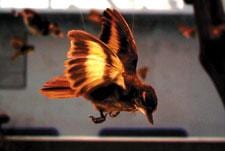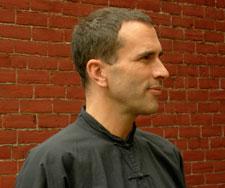
FLIGHT PATH. John Greyson's new short film has a macabre bird motif.
Local legend John Greyson’s potent new short film Covered was to get its world premiere at this year’s Toronto International Film Festival (TIFF). But Greyson withdrew the film from TIFF in protest over the festival’s City to City spotlight on Tel Aviv, fearing the series provided a propaganda coup for the Israeli government and its occupation of Palestine (see story page 9). For the duration of the festival, however, Covered (and Greyson’s letter detailing the film’s withdrawal) can be seen at Vimeo.com/6308870.
In September 2008, Greyson attended the first-ever queer cultural festival to take place in Sarajevo, Bosnia. Despite being dogged by threats, the Queer Sarajevo Festival celebrated its opening with a big, jubilant party. However, an angry mob gathered outside and as attendees were leaving a number of them were chased down and horrifically attacked by the antiqueer hoods. The violence continued online with gory death threats against the organizers and the community, all for the supposed blasphemy of holding a queer event during the holy month of Ramadan in a majority Muslim country. With the police unable (or unwilling) to ensure people’s safety, the festival was cancelled.
The attackers — against whom only two charges have been laid — were young men who would have been children during the civil war of the 1990s, their current disaffections cynically whipped up by rightwing leaders. With Covered, Greyson says he was interested in “trying to place what had happened in the context of Bosnian history, and to hint at and sketch why these young men might have done this.”
As is typical for Greyson, the multilingual and multiscreen Covered juxtaposes several seemingly unrelated themes in order to tease out the complexities and ironies of our present historical situation. The first is the conceit that Susan Sontag wrote an essay on bird-themed charity songs of the Bosnian War entitled “Covered: The Sound of Solidarity,” which we read excerpts of throughout the video.
The second is the running motif of birds. The video begins with a shot of a dead crow on a Sarajevo street and two haunting anecdotes spanning 600 years. “In 1389, during the Battle of Kosovo, so many people died that crows came from all over the Balkans to feast on the corpses for a year…. In 1996, during the Siege of Sarajevo, witnesses claimed that dead crows fell from the sky, littering the sidewalks of the city.” In fact, the dead crow and the beautiful shots of flying swallows were the images that first inspired the video. (Greyson also incorporated shots of the eerie taxidermied birds on display at the ROM.)
The third theme is what Greyson refers to as the “subculture of cover versions on YouTube” and the DIY process undertaken by consumers to remake or remix popular songs online. All these disparate threads came together intuitively in the editing room. “I was trying to signal something about my distance from this story, my distance from this world, and how to make something about it. The puns [generated by the title] are multiple: cover versions, coverage, cover-up, what’s covered and what’s not, uncovered — many spins on a word.
“My interest is in what happens when you make two images collide, like when you make YouTube cover versions collide with archival war footage.”
The answer to the question, “Why Sontag?” comes easily to Greyson. “It’s because of Bosnia. Because her [2004 book] Regarding the Pain of Others came directly out of her experience of going there and doing much more than just war tourism. Hers was a very sustained, committed political act, and very genuine. She really lived there and was sort of the conscience of the world and the conscience of the West.
“War was the subject that brought out the best in her. It’s true with lots of public intellectuals, it demands more and some rise to it. She certainly did.” But Sontag never wrote an essay called “Covered: The Sound of Solidarity.” Channelling Sontag’s distinctive writing style became a point of pride for Greyson. “I like to think I can impersonate Sontag. I kept going back and looking and going, ‘Why is this prose really memorable?’” The answer? “No adjectives. It’s simple, beautiful, plain.”
While music is central to Greyson’s work, it’s particularly apt that there is so much impassioned song in Covered. Above all the piece is a cri de coeur against the Canadian embassy in Sarajevo and their complicit silence and nonintervention in the aftermath of the homophobic attacks, even though they were official cosponsors of the event. “They were at the opening but never seen since,” says Greyson. “The only reason they called back was when I got The Globe and Mail to phone them. It’s their actual job to watch out for Canadian nationals in the country. They’re at an opening and people are brutally, brutally beaten and they’re not returning calls, they’re not emailing.”
Greyson spent about five days in Sarajevo, just doing what he could to help out: Looking for new venues, moving the office to a secret location, trying to contact the embassy and, when the festival was cancelled, soliciting support from international film festivals. The death threats were “really heavy” and the organizers’ contact information was being circulated online. “There was a lot of downtime too a lot of, ‘What do we do?’ I wandered around the city a lot. A lot of it is new and reconstructed and bright and shiny and name-brand boutiques, and then there’s whole stretches of it on the other side of the river that are still bombed out. [The apartment we moved the office to] was on this block where everything else was just a bomb crater, with this single building standing. They had a paid 24-hour security guard — you would always see him sleeping in the car — but anyone could have driven down that road and thrown whatever through the window.”
Organizers are hoping to stage the festival again. “They’re scheduled to go ahead and what they’re trying to do is respond to what’s evolved over this last year. They’re trying to make it more of a conference. It’s much more activist with people speaking out around an agenda of human rights, talking about violence, homophobia, fear. They have to start from scratch in some way. Their big point is: It’s a secular society. A huge secular Muslim community doesn’t agree at all with the violence.”

 Why you can trust Xtra
Why you can trust Xtra


